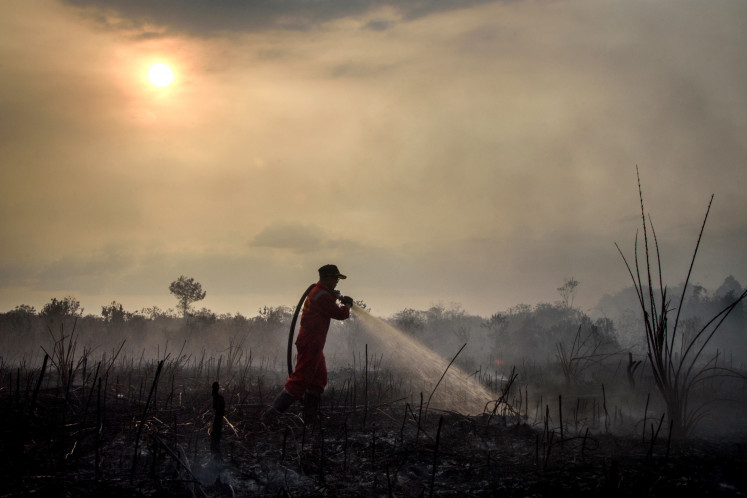Popular Reads
Top Results
Can't find what you're looking for?
View all search resultsPopular Reads
Top Results
Can't find what you're looking for?
View all search resultsRI marks new high in democracy: Survey
The country's Democracy Index (DI) increased this year due to a boost in public political participation as well as the peaceful ending to the political battle of the 2014 general elections, according to research from the University of Indonesia's Center for Political Studies (Puskapol UI)
Change text size
Gift Premium Articles
to Anyone
T
he country's Democracy Index (DI) increased this year due to a boost in public political participation as well as the peaceful ending to the political battle of the 2014 general elections, according to research from the University of Indonesia's Center for Political Studies (Puskapol UI).
The study, which was conducted through surveys of experts in politics, economics and civil society groups, showed that the 2014 Indonesian Democracy Index (IDI) was 5.42 on a 0-10 scale, a 0.45 point improvement from 4.97.
'The Indonesian Democracy Index has been stagnant since 2011 and hovering around a score of five,' UI political lecturer Panji Anugrah said during the launch of the research in Salemba, Central Jakarta, on Friday.
The interviews were conducted using questionnaires with semi-closed questions, in which respondents gave scores on a scale of 0-10.
The 27 respondents surveyed were selected based on their expertise, ideology and roles in society.
This year's result for the index, which is in its fourth year, was based on two aspects: liberalization and equalization.
The liberalization score was measured on how much different sectors in the country could obtain independence and autonomy from the old political regime and could pursue their own interests, while the equalization aspect showed how far minorities could substantially access resources in various sectors and have the same opportunities in accessing the resources.
While Panji said there was still a lot of room for improvement, he admitted that the political situation in 2014 helped to push up the score from the previous year.
The Indonesian Political Index scored 6.72 in 2014, which was the highest among the three sectors. The score was also higher than the previous three years of 5.50 in 2011, 6.16 in 2012 and 5.48 in 2013.
'The positive trend in the Indonesian Political Index is pushed by public participation, civil society participation and media participation. For example, The Jakarta Post could throw its support behind a presidential candidate in 2014. It shows how media is more and more active in politics,' said Panji.
The presidential election battle also polarized the country into two political blocks, resulting in an increase in the intensity of political discussion in the public sphere, according to Panji.
Moreover, the power shift in the political sphere, from the dominance of the Democratic Party in the 2009 election, to the more balanced result in the 2014 election, also resulted in the increase in the Indonesian Political Index, Panji added.
'There is no major power in the legislature. The Indonesian Democratic Party of Struggle's [PDI-P] vote as the winner [of the 2014 legislative election] is the lowest since the reformation era,' he said.










